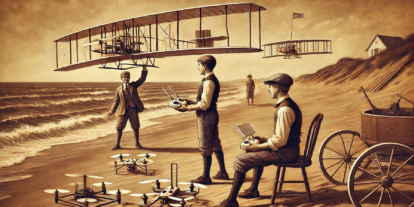In anticipation of the Uniform Law Commission’s Tort Law Relating to Drones Drafting Committee meeting on July 25 in Louisville, KY, some of the biggest names in the commercial drone industry industry have come out swinging in a comment letter against proposed model legislation (the Tort Law Relating to Drones Act) which could have disastrous results for the drone industry if accepted by the Committee and ultimately adopted by States or Congress.
The current draft of the Act highlights the need to see real industry-driven progress on the drone policy front. The drone industry’s strong and uniformly negative reaction should be a reminder that there are broad areas of consensus the industry can build upon. It also shows the need for the industry to educate those in lawmaking or law-suggesting positions so their policy proposals are both practical and realistic.
Digging In: The Uniform Law Commission (ULC) Is Addressing Drones
The ULC seeks to “provide states with non-partisan, well conceived, and well-drafted legislation that brings clarity and stability to critical areas of state statutory law”. Of note, the ULC is not a legislative body because they do not make any laws, but their recommendations have been historically influential. The ULC is comprised exclusively of lawyers qualified to practice law with a long history of promoting the enactment of thoughtful, informed, and uniform state laws.
Generally speaking, a person commits a tort when they perform an intentional or negligent act which harms another person. The person harmed may sue the other party for damages. The Tort Law Relating to Drones Committee was formed in late 2017 to explore changes to state tort law based on the specific challenges inherent to drones becoming more useful, common, and ubiquitous. Since it is increasingly clear that drones are quickly becoming a part of everyday life, the law needs to adapt to this disruptive new technology.
The Committee’s Draft Act Creates More Problems Than It Solves
The Committee’s draft Act raises significant concerns about tort law and the First Amendment. The solutions proposed by the Committee are unrealistic in practice and do not advance the ULC’s stated goals of uniformity, clarity, and stability in the law. Kittyhawk strongly opposes any law that would limit or otherwise impede the critical work done by the Fourth Estate.
The draft Act seeks to significantly expand the definition of aerial trespass. Presently, and historically, aerial trespass requires an aircraft to enter the immediate reaches of the airspace next to the land and cause substantial interference with the use and enjoyment of the land. The draft Act removes this second requirement.
If the draft Act became law, the mere presence of a drone in the airspace up to 200 feet over private property would be, by definition, injuring the landowner and committing aerial trespass. Essentially, the draft Act does not recognize a distinction between a drone which harasses the property owners by hovering feet from a window and a drone, operated by a certificated professional, hovering one foot inside a neighbors property line to snap a photo of an adjacent property.
The draft Act also would mean potential liability for news-gathering organizations in invasion of privacy lawsuits. The draft Act labels any photography of private property which could not be taken from ground level as “offensive” and the operator could be at risk of a lawsuit. Though the draft Act discusses First Amendment exceptions, news organizations can still be dragged into court to defend themselves on First Amendment grounds.
The draft Act’s authors claim their mission is to “promote uniformity of the law with respect to the subject matter…” when in fact it accomplishes the opposite result. There is nothing uniform about legislation that allows property owners to make the airspace above their property a de facto no-fly zone. This will inhibit the commercial industry and put people back in harm’s way doing jobs that are dull, dirty and dangerous.
Individual cities or property owners could choose to enforce the law differently. Businesses need some regulatory certainty before investing in drones for their business and operators generally want to follow the rules. Why are we making it much more difficult and confusing for them to do so? Kittyhawk supports uniformity in the rules and regulations for drones to simplify their use and continue to move the industry forward.
If the committee really wanted to promote uniformity of the law with respect to drones and give operators the certainty everyone knows they crave, it would advocate for regulation in the form of federal preemption.
Industry and Regulators Both Dislike The Draft Act
It is rare that a piece of draft legislation garners such a strong and rapid response from a such a large cross-section of industry and regulators. Noting the ULC’s upcoming July 25 meeting and responding to the current draft Act, some notable companies have made their feelings known — and they are not happy. Major companies including DJI, Amazon, BNSF Railway, drone industry groups such as the Small UAV Coalition, the Association of Unmanned Vehicle Systems International (AUVSI), the Alliance for Drone Innovation and even outside groups like the Cellular Telecommunications Industry Association (CTIA), the Consumer Technology Association, and the Institute for Legal Reform — all signed a comment letter stating fundamental disagreements with the content of the draft Act.
The General Counsels for the FAA and DOT also voiced their displeasure at the draft Act. These senior government attorneys took issue with the statements of law, the legal reasoning behind them, and the implication that the draft Act was developed with consultation from the FAA — not so gently asking the committee to provide their letter to the committee members “so as not to leave a misleading impression of Federal endorsement of the current ULC proposal”.
Conclusion
Kittyhawk advocates for transparency, simplicity and inclusion. We call on the ULC to protect the First Amendment Rights of the America’s citizens by not creating legislation that will make criminals out of the Fourth Estate. Drones offer amazing amounts of opportunity to the world of journalism. We need to make sure we are not extinguishing that.
Moreover, we call on the ULC to live up to their name, charter, and reputation for uniformity by advocating for federal preemption of drone laws. For America to maintain its position as the worldwide leader in aviation, we need common sense drone laws to empower our industry. Needlessly criminalizing drones with an alarming amount of policy that doesn’t address the challenges of today, much less tomorrow, is not the way forward.
This article is also featured in DroneLife.
Andrew Elefant
Andrew Elefant is the Director of Legal & Policy at Aloft, an enterprise drone software company. Andrew is a licensed attorney in California. He is also an experienced Private Pilot with Instrument and Multi-Engine ratings, as well as a certificated Remote Pilot.



